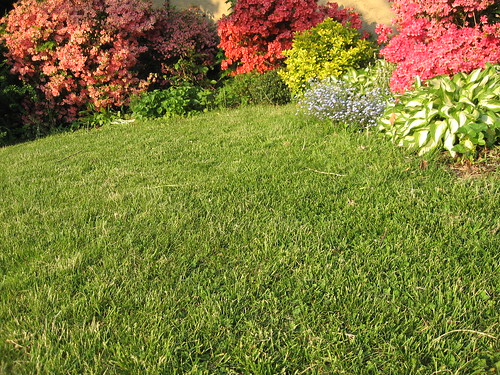Lawn Care

I find the term "lawn care" ironic. Care implies knowledge, first of all. And compassion. It means I do not think of myself first.
Yet, when it comes to lawn care, I am tempted to do the opposite.
- I want to think first of my neighborhood reputation. (Look at the Barkat lawn!)
- I desire to do what is simplest, requiring the least amount of knowledge; thus, I am faced with the temptation to use a chemical fix. (See Craver's discussions on dandelions and a mysterious chemical and herbicide temptations. Very thought provoking.)
- Indeed, society asks me to care very little for the creatures that live in my lawn, walk on it, or receive its runoff. (Which means, ultimately, I am asked not to care for my own health or that of my children's generation.)
So, I was excited to find these, on How to Keep a Chemical-Free Lawn and How to Create a Lawn That's Sustainable. Just a little advice, to put me on my way to lawn care. The kind without irony.
Green Inventions Invitation: if you write a related post and LINK back here, let me know and I'll link to yours.
Front lawn photo, by L.L. Barkat.
Labels: garden, green living, home, stewardship










9 Comments:
Except if your lawn is high-alkaline, then you might want to add a little irony. ;-)
I'm all for getting rid of lawns altogether, but then I've noticed how my kids have enjoyed romping over the fresh, springy lawns of their grandparents and cousins here in New England ... well, maybe that's what parks are for!
Craver... wow... when it comes to humor, you sure can show your mettle. As usual, you made me laugh!
Maria... what would you plant instead? Curious.
First, I have to say this is the first thought that sprang into my head as your post pulled up on my screen: Is that her lawn???! Wow. Beautiful flowers. It must bring you a lot of joy.
This was a very thought-provoking post. I love the way you think about things! I, for one, prefer to have someone else care for my lawn altogether. Which is why I'm glad we're renting a house that came with a gardener, to boot!
I'm trying to figure out what side that places me on. On the one hand, I'm letting the one with knowledge to the caring. On the other hand, I have absolutely zero interest in ever learning how to care for a lawn.
I suppose you can't be a master of all things -- we all have to pick and choose what "lawns" we'll care for in life.
LL -- I just ran across this posting (somehow I missed it in all the activity of last week!) These are great resources. I've just been caring for my lawn over the past couple of days -- doing some research, pulling weeds by hand, looking for problem areas, mowing. I learned a lot from these websites you posted.
One other thing I never thought of in terms of my lawn -- the idea that the "perfect" yard according to our current societal ideals is actuals a monoculture. This ideal lawn would mean all the ground ivy, wild strawberrys, clover, wild violets, dandelions, and other broadleaves that live among my grass would no longer exist. I think my alternative lawn is actually a lot more interesting . . . and I think Wendell Berry, in all his anti-monoculturalism, would agree!
Christianne... yes, it's my front lawn. I love the azaleas! They are as old as the house, about 75 years. And it makes sense for you to pass the "care" to someone else if you know you can't or won't care. But, I wonder if one still might want to mention how the care might happen (organic versus chemical, for instance).
Charity... and the interesting thing about a lot of those broad leaves is that you can eat many of them! So your yard can also be your market. The yard can also be host to beneficial creatures, especially if you leave some "edges" where they can lay eggs and find moisture and protection.
What kind of beneficial creatures?
Craver... very spiritual ones! :) Like the praying mantis for instance... a predator of garden pests. Of course, lady bugs and spiders are also helpful in the garden. Lacewings are also good. When we spray pesticides we kill these along with the "bad" bugs. And when we leave no edges, we are less likely to host these wonderful creatures. Oh, and our pollinator butterflies too. Did you know the Monarch will only lay its eggs on milkweed?
Post a Comment
<< Home